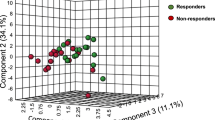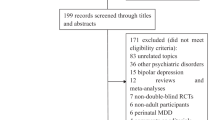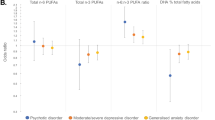Abstract
Long-chain ω-3 polyunsaturated fatty acid (LCn-3PUFA) supplementation may improve symptoms of depression in children and bipolar disorder (BD) in adults. No studies have examined the effectiveness of LCn-3PUFA supplementation in the treatment of mania and depression in juvenile BD (JBD) when given as an adjunct to standard pharmacological treatment. Eighteen children and adolescents with JBD received supplements containing 360 mg per day eicosapentaenoic acid (EPA) and 1560 mg per day docosahexaenoic acid (DHA) for 6 weeks in an open-label study. Intake and fasting red blood cell (RBC) LCn-3PUFA, mania, depression and global function were assessed before and after supplementation. RBC EPA and DHA were significantly higher following supplementation. Clinician ratings of mania and depression were significantly lower and global functioning significantly higher after supplementation. Parent ratings of internalizing and externalizing behaviours were also significantly lower following supplementation. A larger randomized controlled trial appears warranted in this participant population.
This is a preview of subscription content, access via your institution
Access options
Subscribe to this journal
Receive 12 print issues and online access
$259.00 per year
only $21.58 per issue
Buy this article
- Purchase on Springer Link
- Instant access to full article PDF
Prices may be subject to local taxes which are calculated during checkout

Similar content being viewed by others
References
Chang MC, Contreras MA, Rosenberger TA, Rintala JJ, Bell JM, Rapoport SI (2001). Chronic valproate treatment decreases the in vivo turnover of arachidonic acid in brain phospholipids: a possible common effect of mood stabilizers. J Neurochem 77, 796–803.
Clayton EH, Hanstock TL, Garg ML, Hazell PL (2007). Long-chain omega-3 polyunsaturated fatty acids in the treatment of psychiatric illnesses in children and adolescents. Acta Neuropsych 19, 92–103.
Clayton EH, Hanstock TL, Kable CJ, Hirneth SJ, Garg ML, Hazell PL (2008). Reduced long-chain omega-3 polyunsaturated fatty acids in the blood of children and adolescents with bipolar disorder compared to healthy controls. Lipids 43, 1031–1038.
Galloway JH, Cartwright IJ, Woodcock BE, Greaves M, Russell RG, Preston FE (1985). Effects of dietary fish oil supplementation on the fatty acid composition of the human platelet membrane: demonstration of selectivity in the incorporation of eicosapentaenoic acid into membrane phospholipid pools. Clin Sci 68, 449–454.
Harris WS (2007). Omega-3 fatty acids and cardiovascular disease: a case for omega-3 index as a new risk factor. Pharmacol Res 55, 217–223.
Itomura M, Hamazaki K, Sawazaki S, Kobayashi M, Terasawa K, Watanabe S et al. (2005). The effect of fish oil on physical aggression in schoolchildren—a randomized, double-blind, placebo-controlled trial. J Nutr Biochem 16, 163–171.
Lewinsohn PM, Klein DN, Seeley JR (2000). Bipolar disorder during adolescence and young adulthood in a community sample. Bipolar Disord 2, 281–293.
Nemets H, Nemets B, Apter A, Bracha Z, Belmaker RH (2006). Omega-3 treatment of childhood depression: a controlled, double-blind pilot study. Am J Psychiatry 163, 1098–1100.
Stoll AL, Severus WE, Freeman MP, Rueter S, Zboyan HA, Diamond E et al. (1999). Omega 3 fatty acids in bipolar disorder: a preliminary double-blind placebo-controlled trial. Arch Gen Psych 56, 407–412.
Wozniak J, Biederman J, Mick E, Waxmonsky J, Hantsoo L, Best C et al. (2007). Omega-3 fatty acid monotherapy for pediatric bipolar disorder: a prospective open-label trial. Eur Neuropsychopharmacol 17, 440–447.
Acknowledgements
We thank Robert Blake and Melinda Phang for assistance in conducting LCn-3PUFA analyses. We also thank Sonney Morrison and Hunter Area Pathology Service staff for assistance with blood collection. We especially thank Robert Brown, Andrew Millgate and James Neal for constructive advice in the preparation of this paper. We thank Nu-Mega Ingredients Pty Ltd for in-kind donation of ω-3 capsules.
Author information
Authors and Affiliations
Corresponding author
Additional information
Contributors: EHC assisted with design of the study and data collection, was responsible for data analysis and interpretation and drafted the paper; TLH, SJH and CJK collected data and assisted with interpretation and revision of the paper; MLG assisted with interpretation and revision of the paper and PLH assisted with data analysis and interpretation and revision of the paper. All authors contributed to the intellectual content and approved the final version of the paper.
Rights and permissions
About this article
Cite this article
Clayton, E., Hanstock, T., Hirneth, S. et al. Reduced mania and depression in juvenile bipolar disorder associated with long-chain ω-3 polyunsaturated fatty acid supplementation. Eur J Clin Nutr 63, 1037–1040 (2009). https://doi.org/10.1038/ejcn.2008.81
Received:
Revised:
Accepted:
Published:
Issue Date:
DOI: https://doi.org/10.1038/ejcn.2008.81
Keywords
This article is cited by
-
Therapeutic approaches employing natural compounds and derivatives for treating bipolar disorder: emphasis on experimental models of the manic phase
Metabolic Brain Disease (2021)
-
Targeting the immune system in the treatment of bipolar disorder
Psychopharmacology (2019)
-
Emulsified omega-3 fatty-acids modulate the symptoms of depressive disorder in children and adolescents: a pilot study
Child and Adolescent Psychiatry and Mental Health (2017)
-
Omega-3 fatty acids and mood stabilizers alter behavioral and oxidative stress parameters in animals subjected to fenproporex administration
Metabolic Brain Disease (2017)
-
Psychoeducational Psychotherapy and Omega-3 Supplementation Improve Co-Occurring Behavioral Problems in Youth with Depression: Results from a Pilot RCT
Journal of Abnormal Child Psychology (2017)



